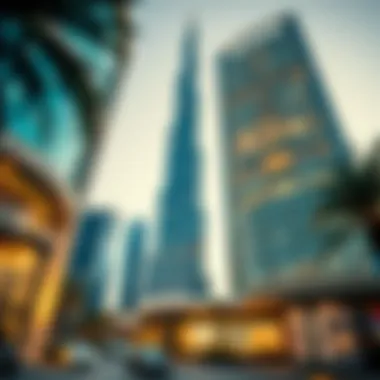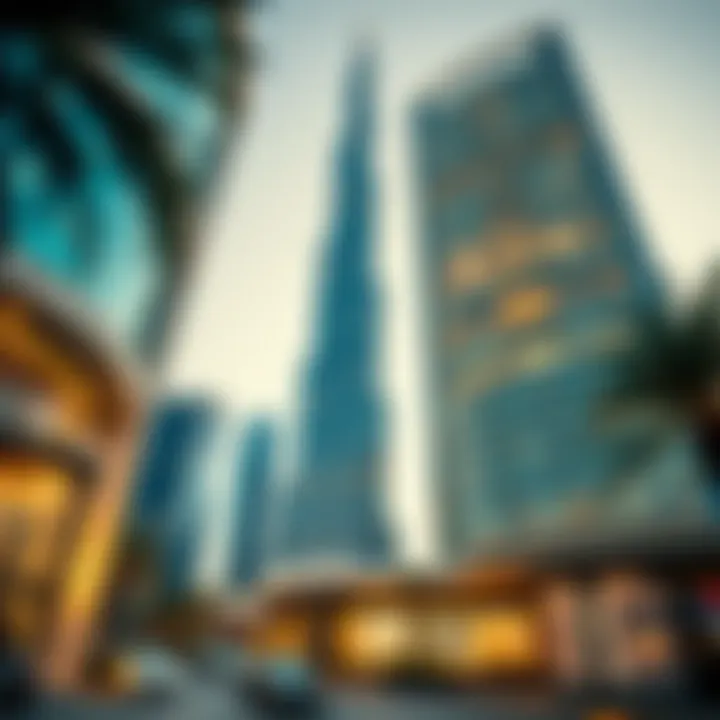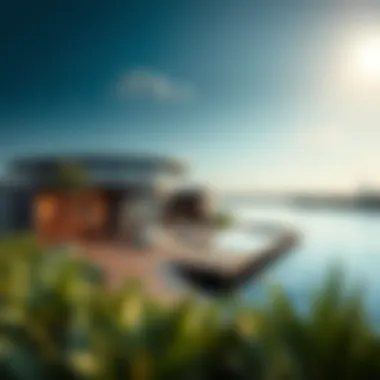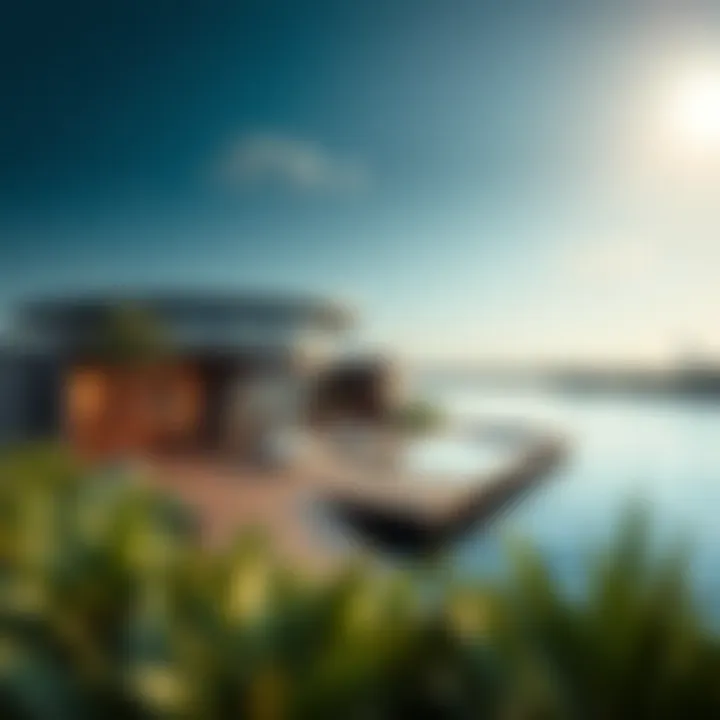Insights into Real Estate Projects in Dubai


Intro
Dubai has become synonymous with luxury and innovation in the real estate sector. With its dazzling skyline and ambitious developments, this city attracts a diverse range of investors and residents. From soaring skyscrapers to sprawling residential communities, each project tells a story of aspiration and opportunity. Analyzing projects in Dubai's real estate market provides both scope and depth into understanding what makes this vibrant sector tick.
In this article, we will delve into the nuances of Dubai’s real estate projects, examining their economic impact, architectural significance, and how they influence the lifestyle of those who call this city home. Grab your hard hat; we're about to embark on a construction tour of Dubai's real estate landscape!
Market Insights
Current Trends in Dubai Real Estate
The Dubai real estate market has been riding a rollercoaster of highs and lows over the years. Presently, there is a noticeable shift towards sustainability and green building practices. Projects are now increasingly incorporating eco-friendly designs and technologies, catering to a market that's becoming more environmentally conscious. The drive for sustainability isn't just a passing trend; it’s quickly becoming a prerequisite for many developers.
In terms of investment trends, there's a growing affinity for off-plan properties. Buyers are drawn to the potential for capital appreciation, as these properties often come at a lower price point compared to ready-to-move-in units. Moreover, the increasing clarity in regulations and the introduction of long-term visas are encouraging overseas buyers to invest, thus injecting vibrance into the market.
"According to the Dubai Land Department, property transactions rose significantly in the past year, indicating renewed investor confidence."
Emerging Areas and Investment Hotspots
Certain neighborhoods are catching the eye of investors and homebuyers. Areas like Dubai Marina, downtown Sheikh Zayed Road, and Al Furjan are well-established, but new hotspots are emerging. Consider Dubai Hills Estate and Dubai South—both areas show promise with meticulously planned communities and a host of amenities. They offer a blend of luxury living with accessibility, attracting a demographic from millennials to luxury retirees.
Investors would also do well to keep an eye on Jumeirah Village Circle (JVC), which has seen a wave of new developments targeting a younger crowd looking for affordable housing options. These emerging neighborhoods are not just about living; they foster a communal lifestyle, aiming to meet the diverse needs of a cosmopolitan population.
Buyer and Renter Guidance
Comprehensive Buying Process in Dubai
Engaging in the real estate market in Dubai can be daunting with its unique set of laws and regulations. Here’s a concise breakdown of the buying process:
- Research and Feasibility Study: Understand the market landscape, property types, and neighborhoods to pinpoint your ideal investment.
- Finding an Agent: Collaborating with a licensed real estate agent can save time and mitigate risks. They bring local insights and market knowledge to the table.
- Visiting Properties: It’s essential to conduct physical walkthroughs. Pictures can be deceiving; experiencing the space first-hand is paramount.
- Legal Framework and Contracts: Familiarize yourself with the Sale Purchase Agreement (SPA) and other legal documents to avoid future complications.
- Financing and Payment: Understanding the financial implications, including payment plans, market fees, and financing options, is crucial before closing the deal.
Essential Tips for Renters in Dubai
For those looking to rent, Dubai's market can be both promising and puzzling. Here are some pivotal tips:
- Know Your Rights: Familiarize yourself with the Tenant Law in Dubai to advocate for your rights efficiently.
- Timing Matters: Begin your search during non-peak seasons, which can save you a chunk of funds on rent, as prices often inflate during peak moving season.
- Roommate Consideration: If budget constraints linger, considering a roommate can help you access better neighborhoods without breaking the bank.
- Seek Long-term Leases: Negotiating a long-term lease may yield more favorable rental terms, including lower monthly payments or some amenities included.
In summation, the Dubai real estate market is a multifaceted environment rife with opportunities for both buyers and renters. From evaluating emerging areas to grasping the nuances of the buying process, informed decisions are vital in navigating this dynamic landscape effectively. Stay tuned for further insights into the architectural wonders and lifestyle options that make Dubai a real estate haven.
Intro to Real Estate Projects in Dubai
The landscape of real estate in Dubai isn’t just about high-rises and glossy brochures. It tells a story—a story about architectural ambition, economic growth, and the lure of a vibrant lifestyle. This introduction aims to provide insights into why the analysis of real estate projects in Dubai holds significant weight for a variety of stakeholders, from local investors to expatriates seeking home permanence.
Importance of Understanding the Dubai Real Estate Market
In a city that seems to redefine itself every few years, understanding its real estate projects is crucial. The market is dynamic, influenced by a tapestry of factors including economic shifts, cultural trends, and evolving government regulations. For investors, comprehending these nuances can mean the difference between lucrative returns and disheartening losses.
Dubai offers a wealth of projects ranging from luxurious villas in Emirates Hills to bustling commercial spaces in Business Bay. Each project presents unique opportunities and risks, requiring potential buyers and investors to equip themselves with thorough knowledge. The complexities of these projects often intimidate newcomers, but being well-informed can unlock a treasure trove of benefits, helping them navigate the maze of property buying with confidence.
Moreover, the variety of developments demonstrates the city’s commitment to attracting a diverse demographic. Investors can choose from residential, commercial, or mixed-use spaces—each catering to different lifestyle aspirations and investment goals.
Benefits of Analyzing Projects
When dissecting real estate projects in Dubai, several benefits become evident:
- Market Insight: By analyzing specific projects, investors can gauge trends to predict future movements in the market.
- Risk Assessment: Knowledge can highlight potential pitfalls, helping investors avoid options that may seem attractive on the surface.
- Strategic Planning: Investors armed with information about architectural plans and community facilities can make calculated decisions, aligning their investments with personal or business objectives.
Considerations to Keep in Mind:
While the prospects are alluring, it is essential to approach the Dubai real estate market with caution. Past trends can sometimes be misleading, and the rapid pace of development can outstrip demand in certain areas. Coupled with regulatory changes, these elements create a volatile cocktail that requires vigilance and foresight.
To illustrate the significance of informed analysis: Imagine you’re a buyer looking at a luxurious apartment in Dubai Marina. Without a grasp of the neighborhood’s rental yield, impending government regulated shifts, and future developments planned nearby, your investment might turn sour. Yet, with due diligence and analysis, the potential for successful outcomes increases dramatically.
“To navigate the world of Dubai real estate, knowledge isn’t just power; it’s a lifebuoy.”
Overall, engaging with real estate projects in Dubai is not merely a search for a property; it’s an opportunity to comprehend the pulse of a city that continually evolves. The subsequent sections will delve further into the intricacies of the Dubai real estate market, shaping an insightful outlook for all involved.
Understanding the Dubai Real Estate Landscape
The realm of real estate in Dubai is as sprawling and diverse as the city itself. To navigate this complex environment, it is crucial to grasp not only the tangible aspects of properties but also the underlying dynamics that shape this market. Understanding the Dubai real estate landscape is essential for anyone looking to invest or even reside in this vibrant city. This knowledge encompasses historical developments, current trends, key neighborhoods, and investment opportunities.
- Historical Context - Knowing how Dubai evolved into a major real estate hub can provide insights into its current practices and future trajectories.
- Current Market Overview - Being up to date with recent market behaviors and statistics can help buyers and investors make informed decisions.
- Investment Opportunities - Grasping the different types of properties available and their potential return on investment is vital for anyone entering the market.
Each facet of this landscape offers a unique perspective, helping stakeholders not just to comprehend the present but also to anticipate future shifts in the market.
Historical Context
Dubai's journey towards becoming a global real estate hotspot did not happen overnight. It stems from a mix of visionary leadership and strategic initiatives. In the late 20th century, the discovery of oil catalyzed Dubai's transformation, leading to significant investment in infrastructure and tourism. Early developments can be traced back to the Burj Al Arab, which opened in 1999, establishing Dubai's reputation for luxury and innovation.
Over the years, the real estate market has witnessed fluctuations, shaped by economic cycles and global events. For instance, the 2008 financial crisis led to a significant downturn, but the market has since rebounded, buoyed by new regulations and a focus on sustainability. By understanding this historical context, current investors can appreciate the resilience of the Dubai real estate sector and its capacity for recovery.
Current Market Overview
As of the latest reports, the Dubai real estate market is in an intriguing phase. Property prices have seen a gradual increase, reflecting growing demand amidst recovering economic conditions. Significant projects like Expo 2020 have propelled the city into the spotlight, drawing attention from international investors and expatriates alike.
- Key indicators
- Luxury segment growth: The demand for high-end properties has surged, indicating a shift in buyer preferences towards spacious homes with premium amenities.
- Residential vs. Commercial: While residential demand remains robust, commercial properties are also gaining traction as businesses adapt to new norms post-pandemic.
"In 2022, Dubai ranks as one of the most attractive real estate markets globally, showcasing a unique blend of traditional charm and modern innovation." [source: en.wikipedia.org]
Types of Real Estate Projects
Understanding the various types of real estate projects in Dubai is crucial for investors and homebuyers alike. Each category comes with its unique set of traits, potential benefits, and considerations that can significantly influence one's investment decisions and living experience. Recognizing these distinctions allows prospective stakeholders to navigate the bustling market more effectively, ensuring they make informed choices that align with both financial objectives and lifestyle aspirations.
Residential Developments


Residential developments in Dubai cater to a vast array of living preferences, ranging from luxury villas to affordable apartments. The city's enduring appeal as a global hub has fueled the rise of innovative residential projects that go beyond mere structures, aiming to create vibrant communities. Here are some salient points regarding residential developments:
- Diverse Offerings: Developers, such as Emaar Properties and Damac Properties, have designed numerous options to meet varying needs and budgets. High-end projects like the Dubai Creek Residences blend luxury with urban convenience, while areas like Jumeirah Village Circle focus on affordability and community spirit.
- Amenities and Lifestyle: Many residential projects come equipped with state-of-the-art amenities, such as swimming pools, gyms, and parks. This not only enhances the living experience but also adds value to the property, making it a more appealing investment.
- Cultural Integration: New developments often incorporate cultural elements, which resonate with both local and expatriate communities. For example, projects near established neighborhoods tend to reflect architectural styles that are familiar and contextually appropriate, thus promoting a sense of belonging among residents.
Commercial Projects
The commercial real estate landscape in Dubai plays a vital role in the economic tapestry of the city. With the ongoing influx of businesses and multinational companies, understanding commercial projects is essential for investors seeking profitable returns. Here are critical aspects to consider:
- Location and Accessibility: Prime locations such as Sheikh Zayed Road and Dubai International Financial Centre (DIFC) are highly sought after for commercial investment. These areas not only promise high foot traffic but also offer proximity to essential services, making them ideal for retail and corporate operations.
- Market Trends: As remote work gains traction, the demand for flexible office spaces is rising. New commercial projects are increasingly factoring in these trends by incorporating co-working spaces that respond to the evolving needs of businesses.
- Potential Returns: Properly located commercial properties often yield higher rental returns compared to residential units. Investors should be keen on the occupancy rates and rental yields while evaluating potential commercial properties, as these can significantly impact long-term revenue.
Mixed-Use Developments
Mixed-use developments embody the concept of integrating living, working, and leisure spaces in one environment, promoting a holistic lifestyle. These projects are gaining immense popularity in Dubai for several reasons:
- Convenience and Accessibility: With residential, commercial, and retail spaces within close reach, residents can enjoy seamless access to daily necessities, reducing travel time significantly. Projects like City Walk and Dubai Hills Estate encourage walkability, fostering a sense of community.
- Enhanced Lifestyle: By combining various functions, mixed-use projects cultivate vibrant neighborhoods that attract diverse demographic groups. This diversification nurtures an energetic atmosphere, making it appealing to families, young professionals, and retirees alike.
- Investment Versatility: From an investment standpoint, mixed-use properties distribute risk across different revenue streams. This variability can lead to a more stable profit margin, particularly in fluctuating market conditions.
In summary, understanding the types of real estate projects in Dubai is integral for anyone looking to invest or reside in this dynamic market. Each type—residential, commercial, and mixed-use—carries unique attributes and rewards that can cater to different investor profiles and living preferences. As the landscape continues to evolve, staying informed about these trends will empower real estate participants to make sound decisions.
Key Neighborhoods for Investment
When diving into the Dubai real estate market, pinpointing the right neighborhoods for investment is crucial. This part of the article will shed light on some of the most promising areas, assessing their appeal, potential for growth, and unique characteristics. For investors, a meticulous selection of location can translate into significant returns, turning dreams into reality.
Downtown Dubai
Often referred to as the heart of the city, Downtown Dubai is undeniably a prime investment hotspot. Home to breathtaking landmarks such as the Burj Khalifa and the Dubai Mall, it marries luxurious living with urban vibrancy.
What makes Downtown Dubai special?
- Cultural Hub: Its central location attracts tourists and residents alike, creating a constant buzz.
- Investment Returns: Properties here usually hold high value, ensuring attractive return rates for investors.
- Luxury Lifestyle: The area is known for its magnificent skyline and plush amenities.
"In Downtown Dubai, an investment isn’t just about bricks and mortar; it’s about an unparalleled lifestyle."
However, the competitive market means buyers need to be savvy, undertaking thorough research and possibly working closely with a real estate agent with local expertise.
Dubai Marina
Dubai Marina offers a unique blend of luxury and leisure. This waterfront community is particularly popular among expatriates and affluent locals, featuring glittering skyscrapers along the coast.
Key Features of Dubai Marina:
- Vibrant Community: The Marina Walk, lined with shops and restaurants, creates a social atmosphere that's hard to resist.
- Accessibility: The area's connectivity through the tram and metro makes it convenient for residents to move around.
- Diverse Options: From high-rise apartments to villas, there's something for every buyer's taste and budget.
Investors enjoy a lucrative rental market, with many choosing this area for its appeal to both short-term vacation rentals and long-term stays.
Jumeirah Village Circle
Jumeirah Village Circle (JVC) is often considered an emerging area, ideal for those looking to invest at a lower entry point while accessing future growth possibilities.
Why invest in JVC?
- Family-Friendly Environment: Plenty of parks and schools make it attractive for families looking to settle.
- Value for Money: Property prices are generally more affordable, with lots of opportunities for resale value increase.
- Community Spirit: The overall atmosphere is welcoming, promoting a sense of belonging among residents.
Investors might find this neighborhood appealing due to developing infrastructure that could bolster property values in the ensuing years.
Business Bay
Business Bay stands out as Dubai's central business district, filled with commercial towers, hotels, and residential buildings that form a new urban landscape.
Highlights of Business Bay:
- Economic Activity: Being the hub for business ensures a healthy demand for both commercial and residential space.
- Proximity to Downtown: Its closeness to Downtown Dubai adds to its allure, making it a sought-after location for professionals.
- Evolving Landscape: With ongoing developments, the area promises to transform into an even larger lifestyle and business destination.
The potential for rental yields in Business Bay remains strong, making this area a notable option for those seeking both growth and stability in their investments.
Investment Opportunities in Dubai
In the dynamic world of real estate, understanding investment opportunities in Dubai is pivotal for anyone looking to make their mark in this bustling market. Dubai is not just a city of luxury and ambition; it's a haven for investors. The blend of a strong economy, strategic location, and favorable government policies creates a fertile ground for both seasoned and novice investors.
Investors are drawn to Dubai for various reasons. First and foremost is the diverse range of properties available. Whether you’re eyeing high-rise apartments in the heart of Downtown or a sprawling villa in Palm Jumeirah, the choices are plenty. This variety is not just visually appealing; it offers potential for significant capital appreciation over time. Furthermore, lower property prices compared to global benchmarks make it possible for international buyers to dip their toes into the market without breaking the bank.
Emerging Markets
When exploring investment opportunities, one cannot overlook the emerging markets within Dubai's real estate sector. Areas that were once considered outskirts are now rapidly evolving into vibrant communities. For instance, the Dubai South development is a game changer. It's strategically located near the Al Maktoum International Airport, which is slated to be one of the largest airports in the world. This development is set to host a mix of residential, commercial, and logistics projects, making it an attractive prospect for investors.
Another promising area is DubaiLand, aimed at becoming the region's foremost entertainment and retail destination. With projects like IMG Worlds of Adventure and Dubai Parks and Resorts, this area is not just entertainment focused but is also seeing an influx of residential projects catering to families looking for a community vibe.
Investing in these emerging markets allows buyers to get in on the ground floor. Getting ahead in the game often means identifying trends before they become mainstream. By the time these areas hit their growth trajectories, early investors can see their property values skyrocket.
Luxury Real Estate
On the other end of the spectrum lies luxury real estate in Dubai—a sector that often steals the spotlight for its opulence and exclusivity. From the exorbitantly high-end Burj Khalifa apartments to the luxury villas along the coastline, the luxury market in Dubai offers unparalleled opportunities for discerning investors.
One of the key factors driving the demand for luxury properties is the influx of wealthy expatriates. Dubai offers an attractive lifestyle with no personal income tax and world-class amenities, making it a prime destination for the high-net-worth individuals.
Moreover, luxury real estate in Dubai often comes with a strong potential for rental income. Many luxury properties are purchased with the intention of generating revenue through short-term rentals, particularly given the city's booming tourism sector. Properties like those in The Palm or the Burj Al Arab frequently command premium rates due to their status and location.
Investors must, however, carefully consider their options. Not every luxury property guarantees a return on investment; understanding market trends, property management costs, and location desirability is crucial. Selected properties in affluent areas tend to appreciate much faster, but they also require a keen eye and sometimes, a hefty upfront investment.
"Understanding the nuances of both emerging markets and luxury segments can provide investors with a strategic edge in the Dubai real estate landscape."
The Role of Developers and Builders
Developers and builders play a pivotal role in the real estate scene in Dubai. They are not just the architects of structures; they are key players in shaping the urban landscape and influencing the market dynamics. Understanding their role is essential for anyone looking to invest or buy property.


There is a variety of developers, from established giants to emerging players. Their contributions can greatly impact the livability, sustainability, and overall quality of life in the areas they develop. The kinds of projects they undertake—from high-rise luxury apartments to sprawling mixed-use communities—can also draw in different demographics, adding to the vibrancy of neighborhoods.
Major Developers in Dubai
When delving into Dubai's real estate sector, several names pop out prominently, characterized by their significant contributions and ongoing projects:
- Emaar Properties: Known for iconic developments like the Burj Khalifa and Dubai Mall, Emaar sets the bar high with premium offerings.
- Damac Properties: With a focus on luxury and lifestyle, Damac has crafted signature projects such as the DAMAC Hills community, which resonates with affluent buyers.
- Nakheel: The mastermind behind the Palm Jumeirah, Nakheel is a leader in creating splendid waterfront communities.
- Dubai Holding: They are renowned for not only residential projects but also for large-scale endeavors like the Dubai Design District.
Moreover, smaller developers are emerging, demonstrating fierce competition and innovation, pushing the envelope with mixed-use concepts and affordable residential options. These companies facilitate the rise of distinctive neighborhoods and offer a variety of housing solutions, which appeal to both residents and investors alike.
Evaluating Developer Reputation
Choosing the right developer is akin to finding a needle in a haystack; it requires thorough research and understanding. Here are key factors to consider when assessing a developer's reputation:
- Track Record: Look into past projects. If a developer has consistently delivered on time with high-quality standards, it builds credibility.
- Client Feedback: Reviews from previous buyers can illuminate potential red flags. Engage with individuals who've bought properties from the developer.
- Financial Stability: A solid financial background suggests that the developer can handle large investments and predict market trends.
- Sustainability Practices: Increasingly, buyers are interested in how eco-friendly a developer's practices are. A commitment to sustainable development often speaks volumes about their overall approach.
"The right developer not only constructs buildings but nurtures communities."
Evaluating developers is crucial as built integrity can't be overlooked. An established reputation not only assures quality but also provides a sense of security for buyers.
In sum, developers and builders are the backbone of Dubai's real estate scene. Their efforts in shaping the city’s architectural landscape and addressing the housing needs of its diverse population underscore their importance beyond just construction—they are integral to the overall economy and lifestyle of Dubai itself.
Architectural Trends in Dubai Real Estate
Dubai’s real estate scene is more than just a collection of buildings; it’s a showcase of architectural innovation and a testament to visionary design. The importance of discussing architectural trends lies in their ability to shape not only the skyline but also the quality of life for residents and the city’s overall identity.
With the rapid growth and transformation of Dubai, architectural trends reflect a confluence of culture, technology, and lifestyle aspirations. Understanding these trends can provide insights for investors, homebuyers, and anyone looking to navigate this ever-evolving market. Today’s projects often prioritize both aesthetic appeal and functionality, aimed at meeting the diverse needs of residents and businesses alike.
Innovative Designs
In Dubai, innovation seems to be the name of the game. Architects and developers are crafting structures that defy traditional design norms, embracing bold shapes and unconventional materials. For instance, the Burj Khalifa, recognized globally, stands not only as a marvel of engineering but as an architectural symbol of ambition. It's designed to withstand the harsh desert climate while providing luxury living and workspaces.
Another notable example is The Dunes, a residential project that incorporates bio-mimicry into its design, allowing buildings to blend seamlessly with their environment. These creative endeavors don’t only aim for visual impact; they also enhance the usability of spaces while being cost-effective over time.
Innovative designs bring a host of benefits:
- Cultural Representation: Architecture here is often inspired by local traditions, creating a sense of identity.
- Economic Growth: Unique designs can attract tourists and investors alike, stimulating the local economy.
- Enhanced Lifestyle: Projects consider the needs of residents by combining living, working, and recreational areas seamlessly.
Sustainable Practices
As the world becomes increasingly aware of environmental implications, sustainable practices in architecture have gained momentum in Dubai. Builders are taking strides towards environmentally-friendly solutions. Choosing sustainable building materials and energy-efficient systems is now becoming standard in many new projects.
The Dubai Sustainable City stands out as a prime example. This development emphasizes green living through solar panels, recycled water systems, and car-free zones. Not only does it aim to lower carbon emissions, but it also promotes a healthier lifestyle for its residents.
Key sustainable architectural practices include:
- Energy Efficiency: Implementing innovative insulation techniques and renewable energy sources helps reduce energy consumption significantly.
- Water Conservation: Projects increasingly utilize technologies that reclaim and reuse water for irrigation and other needs.
- Smart Technology: Many new buildings feature integrated smart systems that allow occupants to monitor and control their environment, leading to more efficient energy use.
In summary, architectural trends in Dubai are a mix of art and practicality. They offer investors not just a space to live or work, but a comprehensive lifestyle option that resonates with global standards and sustainability goals. As the city continues to develop, keeping an eye on these trends is essential for anyone engaged in its real estate market.
Legal Considerations When Investing
Understanding the legal nuances of investing in real estate in Dubai is crucial. This is not just a bureaucratic hurdle; it's the foundation upon which sound investment decisions are built. Familiarity with property laws safeguards buyers, ensuring they engage wisely. This section will delve into important facets of property laws and documentation necessary for a smooth transaction process.
Understanding Property Laws
When entering the Dubai real estate market, investors must familiarize themselves with the local property laws that govern transactions. The UAE has a liberalized approach towards foreign investment, allowing non-residents to buy property in designated areas known as "freehold" zones.
The Abu Dhabi Global Market and Dubai International Financial Centre are examples where foreigners can own property fully. However, there are restrictions in other areas, notably when it comes to residential properties. Foreigners may own a maximum of 49% of a non-freehold project.
Moreover, understanding the implications of the Real Estate Regulatory Agency (RERA) laws is indispensable. RERA governs property transactions and offers protection to buyers through regulations around disclosure and transparency from developers. This way, investors can ensure they are not being led astray by vague advertisements or verbal promises.
In addition, prospective buyers should be aware of the implications of leasehold agreements versus freehold ownership. While leasehold may appear attractive due to lower upfront costs, it comes with long-term obligations that must be understood before committing.
Required Documentation
To navigate the complexities of real estate transactions in Dubai, having proper documentation is paramount. Buyers will need several key documents to successfully complete their purchases:
- Passport Copy: A government-issued ID showing identity and nationality.
- NOC (No Objection Certificate): Issued by the developer or builder, validating that all dues are settled, ensuring a hassle-free transfer of ownership.
- Title Deed: It proves ownership and is registered with the Dubai Land Department (DLD).
- Sales and Purchase Agreement (SPA): An essential legal contract outlining the terms and conditions of the property sale, which binds both the buyer and seller.
- Emirates ID: Necessary for expats to establish residency and facilitate the buying process.
Having these documents in order saves both time and potential legal snags. It's wise for investors to work closely with a legal representative who specializes in Dubai property laws to ensure all paperwork is accurate and meets the regulations set forth by RERA and DLD.
"Navigating the legal landscape of Dubai's real estate market is half the battle. Knowledge is power, and with thorough understanding, investors can protect themselves from costly mistakes."
In summary, awareness of the legal framework surrounding property investment in Dubai equips investors with the insightful tools necessary for making well-informed choices. This knowledge not only helps in formal transactions but also instills confidence when dealing with various stakeholders in the ever-growing market.
Financing Options for Buyers
When it comes to navigating the Dubai real estate market, understanding the financing options available is vital. This element acts as the backbone for investors and homebuyers alike, ensuring they can secure funding for their desired projects. With Dubai's real estate sector being as dynamic as it is, solid financing choices can not only involve conventional mortgages but also extend to innovative financial solutions.
Investors must weigh their options carefully. Knowing what’s out there and what fits your financial situation can make or break your real estate journey. Below are two primary avenues to consider when seeking financing in Dubai.
Mortgage Requirements
A mortgage is a common choice among buyers who are planning to finance their property purchase through a loan. Banks and financial institutions in Dubai typically offer a range of mortgage products, but they come with specific criteria that you must know before applying. Common requirements include:
- Minimum Deposit: Most lenders ask for a minimum down payment of 20%. However, for expatriates, this can be higher, usually around 25% to 30% of the property value.
- Proof of Income: You’ll need to provide documentation that includes salary slips, bank statements, and possibly proof of additional income streams.
- Age Restrictions: Typically, banks impose a maximum age limit for loans. Borrowers usually must be under a certain age, often 65, by the time the mortgage ends.
- Credit Score: A goo credit score can facilitate better interest rates and terms. Banks often require a score above a specific threshold.
- Employment Stability: A stable employment history adds to your credibility as a borrower.
Securing a mortgage in Dubai can be straightforward if you meet these requirements. It's strongly advisable to shop around, as different banks may offer various interest rates, fees, and terms that suit you best.
Alternative Financing Solutions
Besides traditional mortgages, there are alternative financing solutions that might cater more closely to individual buyers’ needs. Understanding these can broaden your options and possibly lead to better terms. Here are a few notable alternatives:


- Payment Plans Offered by Developers: Many developers provide their own financing options, including payment plans that allow buyers to pay in installments over a specified period. This can be a golden opportunity for those who wish to lessen the immediate financial load.
- Islamic Financing: Sharia-compliant mortgages avoid interest payments, allowing for profit-sharing arrangements instead. This is particularly appealing to Muslim investors.
- Private Financing: Sometimes, private lenders or investors provide additional financing options, often at varying terms than traditional banks. They may be more flexible with credit requirements.
- Home Equity Financing: If you already own a home in Dubai, leveraging its equity can provide funds for a new real estate investment.
In a market as booming as Dubai’s, considering diverse financing options can lead to significant financial advantages. Being informed about these alternatives and traditional methods forms a sturdy foundation for making informed investment choices.
"Understanding your financing options is as crucial as choosing the right property."
By addressing these elements thoughtfully, buyers can navigate the complex landscape of Dubai's real estate market more effectively.
The Renting Market in Dubai
Understanding the renting market in Dubai is essential for anyone looking to navigate this vibrant and rapidly evolving real estate landscape. With its unique blend of cultures and economic opportunities, Dubai has become a magnet for expatriates and locals alike. Therefore, knowing the dynamics of the rental market is not just beneficial, but crucial for both tenants and landlords.
The renting market serves as a barometer for the overall real estate sector. It reflects changes in demand, economic health, and demographic shifts. Furthermore, various developments in the city affect rental prices and tenant preferences. With the ongoing expansion of infrastructure and the introduction of new lifestyle options, the renting market in Dubai is not static but is a signal of the city’s evolution.
Exploring Rental Trends
When evaluating rental trends in Dubai, it is essential to consider various factors that influence pricing and demand. According to recent statistics, areas like Dubai Marina and Downtown Dubai remain popular hotspots, drawing in both upper-middle-class expats and affluent professionals. However, quieter neighborhoods such as Jumeirah Village Circle are also seeing an uptick in interest as they offer more space at a slightly lower price tag.
A significant trend is the rise of flexible leasing options. Many landlords are now offering short-term rentals to accommodate the growing number of tourists and expatriates who might prefer a temporary stay over a long-term commitment. This also includes platforms like Airbnb that have gained traction in recent years. More tenants are opting for furnished apartments, as this move eases the transition into a new city and lessens the ambiguity of home setup costs.
- Key Rental Trends:
- Increased demand for short-term leasing.
- Furnished apartments now preferred.
- Shifts towards family-friendly neighborhoods.
- More emphasis on community amenities like gyms and parks.
Ultimately, these trends not only enhance the living experience but also provide lucrative opportunities for landlords seeking to maximize their investments.
Tenant Rights and Responsibilities
In the context of the Dubai rental market, both tenants and landlords have specific rights and responsibilities, underscoring the need for clarity and understanding on both sides. Under the Dubai Rental Law, tenants are entitled to a lease agreement that clearly outlines the terms of their rental. This includes details on the duration, rent amount, and conditions for termination.
Moreover, tenants in Dubai have the right to live in a property that is safe and well-maintained. It's not just about the four walls; it’s about comfort and security. Should any issues arise related to property maintenance, it is the tenant's responsibility to report these situations to the landlord promptly.
On the flip side, tenants must also uphold certain responsibilities. Paying rent on time is non-negotiable. Additionally, they are expected to treat the property with care and respect the shared spaces in apartment complexes. Understanding these rights and responsibilities is pivotal, as it not only protects the tenant but fosters a harmonious relationship with landlords.
"Awareness of one’s rights can empower tenants to speak up when they’re met with challenges, and it serves as a reminder for landlords to maintain their obligations."
- Tenant Responsibilities:
- Timely payment of rent.
- Proper maintenance of the rental property.
- Adhering to community rules and regulations.
In summary, the renting market in Dubai is vibrant and presents an array of opportunities. However, becoming well-acquainted with rental trends and understanding rights and responsibilities can mitigate potential conflicts, making the renting experience more enjoyable and fruitful for all parties involved.
Market Challenges and Risks
When it comes down to the real estate sector in Dubai, understanding the market challenges and risks is just as vital as knowing the opportunities. This section will explore the tough aspects that investors, expatriates, and homebuyers must navigate in such a fast-paced environment. Managing risks effectively can make a significant difference between hitting a home run or striking out in today’s volatile market.
Economic Impacts
One of the biggest economic impacts on the Dubai property market stems from the inherent fluctuations in global economic conditions. For instance, a downturn in oil prices often reverberates through the local economy, affecting job security and, in turn, consumer confidence. This uncertainty can lead potential buyers to hold onto their cash rather than commit to property investments.
Moreover, the strong interconnectivity of Dubai's economy with international markets means that any global trend—be it trade wars, shifts in foreign policies, or global recessions—can ripple across the landscape here, negatively affecting real estate valuations. Currency fluctuations also play a role; a strong dollar can deter investors from regions with weaker currencies.
"Real estate investment isn’t merely about the bricks and mortar. You must consider the larger narrative of economic indicators. Understanding these can be your North Star when making decisions."
Property Regulation Changes
Keeping an eye on property regulation changes is crucial for anyone involved in Dubai’s real estate market. The government often updates laws, aiming to improve transparency and protect investors. While these measures are designed to fortify the market, they may also pose risks if not diligently monitored. For example, any sudden changes in laws regarding foreign ownership could lead to immediate implications on project viability and sales.
In recent years, many expats looking to buy property in Dubai have enjoyed relaxations in ownership laws. However, these changes could shift at any moment based on regulatory reviews or economic conditions. Moreover, compliance with zoning laws, building codes, and tenant rights cannot be taken lightly.
Incorporating thorough due diligence before purchasing property is non-negotiable. As a savvy investor or homebuyer, understanding these regulations can spare you from legal troubles that could derail your plans or investments.
Future Prospects of Dubai Real Estate
The future of Dubai's real estate is both a captivating vision and a subject of serious forecasting. As the world’s eyes gloss over this vibrant metropolis, the distinctions between potential, opportunity, and caution are laid bare. Understanding where the market is heading holds immense value for investors, expatriates, and anyone considering property in this dynamic locale. The construction of new neighborhoods, innovative projects, and the influence of global trends all play pivotal roles in shaping what lies ahead.
Among the myriad aspects worth exploring is the growing importance of sustainability in future developments. As more people become conscious of environmental concerns, there is a clear trend toward eco-friendly designs and energy-efficient technologies. Developers are not merely following trends; they are increasingly harnessing innovation to create sustainable living spaces that benefit both residents and the planet. Such elements not only improve the quality of life but also shift the paradigm of what constitutes luxury in real estate.
"With the growing emphasis on sustainability, the property market in Dubai is set not just to grow but to evolve, blending comfort with responsibility."
Projected Growth Areas
Several areas in Dubai show remarkable potential for growth, reflecting broader trends in investment, migration, and infrastructure. For instance, the Dubai South development is positioned to become a city within a city, fueled by promises of improved transport links with the upcoming Expo 2020 legacy projects and the Al Maktoum International Airport. This area is anticipated to serve as a vibrant hub for both business and residential communities, attracting individuals looking for affordable yet modern living spaces.
Moreover, the expansion of the Dubai Creek area is turning heads. Its transformation aims to enhance connectivity and introduce a unique blend of cultural, commercial, and residential offerings. The combination of leisure facilities, parks, and various amenities makes it an appealing choice for homebuyers and investors alike. As revitalization projects continue, one can expect significant appreciation in property values.
Key growth areas include:
- Dubai South: A modern approach to urban living, integrating various lifestyles.
- Dubai Creek: A blend of history and modernity, steadily transforming into a bustling hub.
- Jebel Ali: Focused on industrial and logistics, but also becoming attractive for housing developments.
Influence of Global Dynamics
The dynamics of the global economy significantly sway the future of Dubai’s real estate sector. Factors such as shifting demographics, economic partnerships, and geopolitical trends all play critical roles. With the rise of remote work, the influx of expatriates has seen a change, leading to increased demand for flexible living arrangements and modern amenities that cater to new lifestyles.
Furthermore, trade ties and foreign investments dramatically affect the landscape. As Dubai positions itself as a gateway between the East and West, its real estate market becomes a safe harbor for international investors seeking stability and growth. The UAE's progressive government policies, such as long-term visas for expatriates, further enhance its attractiveness as a destination for living and investing.
Epilogue
In reflecting on the intricate tapestry of the Dubai real estate market, one can hardly overstate the import of understanding the various projects within this vibrant sector. Each investment, whether in residential, commercial, or mixed-use developments, carries significant implications not just for the economic landscape, but also for the social fabric of communities. This concluding section synthesizes the insights gleaned throughout the article, emphasizing key elements that prospective investors or homebuyers must keep in mind.
Firstly, the dynamic nature of Dubai’s real estate industry means that staying informed is crucial. Market trends shift swiftly, influenced by global economic movements and local regulations. Hence, leveraging resources, such as reputable real estate platforms, academic articles, and government publications, can serve as vital tools in decision-making. A breadth of knowledge empowers buyers to spot both opportunities and pitfalls that might not be immediately apparent.
Moreover, understanding the architecture and design principles in Dubai is equally essential. The city is famed for its unique and innovative constructions, and being aware of these can enhance both investment effectiveness and personal satisfaction. For instance, properties incorporating sustainability features can fetch better long-term returns, thanks to the increasing value placed on eco-friendly living.
Importantly, as one navigates through investment opportunities in burgeoning neighborhoods or luxury enclaves, being mindful of the legal framework guiding property ownership is a must. The regulations might be overwhelming at first glance, with numerous requisites and paperwork, but tackling them head-on ensures a smoother transaction process. Engaging legal experts when necessary can't be stressed enough.
Lastly, the ups and downs of market cycles can be challenging. Investors often face decisions amidst fluctuating property prices and evolving tenant needs. Thus, delving into economic impacts and potential risks ought to be a habitual practice, allowing investors to build resilience in their strategies.
A cohesive understanding of the complete picture is quintessential in the Dubai real estate realm. This article not only highlights the multifaceted opportunities available but it also encourages a proactive approach toward investment, nurturing awareness and adaptability in a fast-paced environment. In sum, the potential for growth within this arena is substantial, yet it requires due diligence to navigate successfully.















